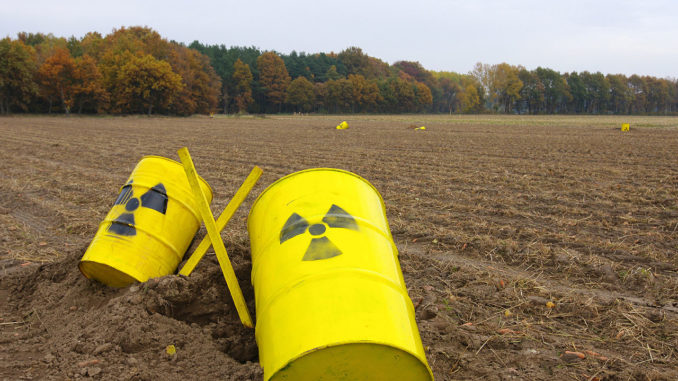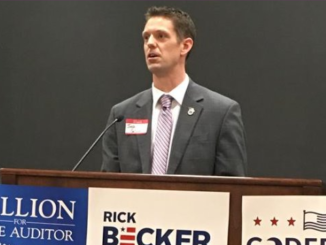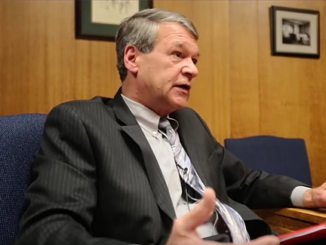
How would you feel about the prospect of the United States Department of Energy drilling a nuclear bore hole in your backyard? Ask the folks in Pierce County. There’s more than a few of them with some pretty strong feelings on the subject. Why? Because it’s an issue they’ve been dealing with for a few years now.
Three years ago Pierce County officials were able to block a proposed bore hole from happening when they placed a moratorium on such projects. This particular project came as a result of the Department of Energy giving a $35 million grant to Battelle Memorial Institute (BMI)— a research and development nonprofit. Battelle then partnered with the University of North Dakota’s Energy and Environmental Research Center (EERC) in Grand Forks to carry out the project.
At the time, the Jamestown Sun described the bore hole project this way:
“No nuclear disposal is planned, but a 20-acre site south of Rugby has been identified as a good location to drill 16,000 feet down to determine if such crystalline rock is suitable for disposal.
…“The idea is to study the deep rock — prevalent under much of the country — for stability, water permeability, geothermal qualities and seismic activity to learn whether it’s a safe candidate for long-term storage of spent nuclear fuels. There is currently no federal nuclear disposal program.”
EERC’s representative, John Harju, was apparently frustrated at the time by what he termed “opinion skewed by small sound bites”. Harju went on to say:
“No one is requesting disposal of nuclear materials in the state or at this location. This is a science and engineering project, not a nuclear waste disposal project.”
It should be noted that BMI and EERC didn’t do themselves any public relations favors when the officials in Pierce County found out about the project from newspapers and citizens— instead of BMI and EERC.
Yet, even if what Harju said at the time is true, isn’t it at least understandable that Pierce County folks would be concerned? What if the site was deemed a favorable location for nuclear waste? Would it be unreasonable to conclude that such a site could one day become a depository for high-level radioactive nuclear waste? I don’t believe this line of thinking would be irrational at all.
As you will see in this Background Memorandum, all of this led to Senate Bill 2156 during the 2017 Legislative Session, which called for a Legislative Management Study on the issue. The purpose of the study was to accomplish the following:
- Determine whether state and local level regulation of high-level radioactive waste disposal is consistent with applicable federal regulations.
- How to ensure the state has proper input into the federal location selection process for high-level radioactive waste material deposits.
- Determine the logistics of calling a special session to approve the depositing of high-level radioactive waste material in the state.
- Study the notice of disapproval requirements under federal law; special laws, local laws, and existing code regarding the potential existence of a legislative veto over executive branch authority to determine the size, scope, and location of high-level radioactive waste material deposits in the state and any existing conflicts with the commerce clause.
- Determine the feasibility and desirability of developing new statutes and regulations for subsurface disposal of waste and the storage and retrieval of material.
The study was overseen by the Interim Natural Resources Committee following the 2017 Legislative Session. You can see the minutes and documentation from all their meetings here. While it’s difficult to know the full context of a meeting from meeting minutes, some of it is quite interesting. Take this entry for example from the September 20, 2017 meeting:
“In response to a question from Senator Luick, Mr. Volk said the containers the Secretary of Energy had identified were 18 inches in diameter and emitted a continuous blue glow. He said 40 containers would be stacked into a 3-mile deep hole into the ground with no chance of retrieval because the containers would melt and be permanently sealed. He said a straight hole has never been drilled that deep. He said a 4-mile deep hole was drilled in Russia, but was drilled in a zig-zag formation because of technological drilling limitations.”
Then there’s this one from the same meeting in relation to constitutional issues:
“In response to a question from Representative Porter, Mr. Murphy said he would defer all legal questions to the Attorney General’s office. Ms. Margaret Olson, Assistant Attorney General, said many states that had statutes prohibiting the federal government from depositing high-level radioactive waste in their state were preempted and held unconstitutional.”
And this one on the state’s limited authority:
“… North Dakota has no authority or role in regulating high-level radioactive materials because that regulatory authority belongs to the Nuclear Regulatory Commission. He said the Nuclear Regulatory Commission regulates the transportation, handling, disposal, and storage of high-level radioactive material. He said North Dakota has the authority to regulate low-level radioactive materials with oversight from the Nuclear Regulatory Commission.”
The minutes from a December 13, 2017 meeting illustrates potential disposal of nuclear waste from neighboring states:
“In response to a question from Senator Piepkorn, Mr. Murphy said there are nuclear power plants in Minnesota and Nebraska and also to the southwest of North Dakota from which radioactive waste could be produced and delivered to North Dakota for disposal or storage.”
As a result of the interim study, Legislative Management introduced Senate Bill 2037 for consideration in the current 2019 Legislative Session. There’s a lot to the 18-page bill, but four things in particular seem problematic for many in relation to the proposed authority to be granted North Dakota’s three-member Industrial Commission— which is made up of the Governor, Attorney General, and Agriculture Commissioner:
- They would have “jurisdiction and authority over any person or property, public or private, necessary to enforce this chapter.”
- They could “issue a notice of disapproval regarding a proposed high-level radioactive waste facility in accordance with federal law when the legislative assembly is not in session.”
- They’d be authorized to “enter agreements with the federal government regarding high-level radioactive waste regulation and facility siting…”.
- And perhaps the most troublesome for many… “A county zoning regulation may not prohibit a high-level radioactive waste disposal exploratory drilling permit or a high-level radioactive waste facility permitted by the commission, but may regulate the size, scope, and location.”
The implications of this are significant. This is a lot of authority to place in the hands of three people. As you can imagine, all of this isn’t setting well with many of the folks in Pierce County— as illustrated by a recent editorial in the Pierce County Tribune. I can’t say that I blame them.
As it stands now, SB 2037 passed the Senate on a vote of 42-3 earlier this month. Today, it was introduced in the House and has been referred to the Energy and Natural Resources Committee for consideration there.
I don’t pretend to know all the ins and outs of this issue. But I can certainly understand how troublesome — even problematic — the situation is to the people of Pierce County. When you seek to claim “jurisdiction and authority over any person or property, public or private”, while stripping away the ability from the county to protect its citizens in such matters, then it’s only natural for the locals to have serious reservations about those things.
How would you feel if they wanted to drill a nuclear bore hole in your backyard?
PLEASE LIKE & SHARE!
Sources:
- https://www.jamestownsun.com/news/3938988-pierce-county-bans-deep-bore-drilling
- https://www.battelle.org/about-us
- http://www.eerc.und.nodak.edu/Default.aspx
- https://www.legis.nd.gov/files/resource/committee-memorandum/19.9054.01000.pdf
- https://www.legis.nd.gov/assembly/65-2017/documents/17-0107-05000.pdf
- https://www.legis.nd.gov/assembly/65-2017/committees/interim/natural-resources-committee
- https://www.legis.nd.gov/assembly/66-2019/bill-index/bi2037.html
- https://www.nd.gov/ndic/
- http://www.thepiercecountytribune.com/page/content.detail/id/534080/EDITORIAL–Legislature-s-effort-on-nuclear-waste-disposal-an-insult-to-Pierce-County.html?nav=5000




